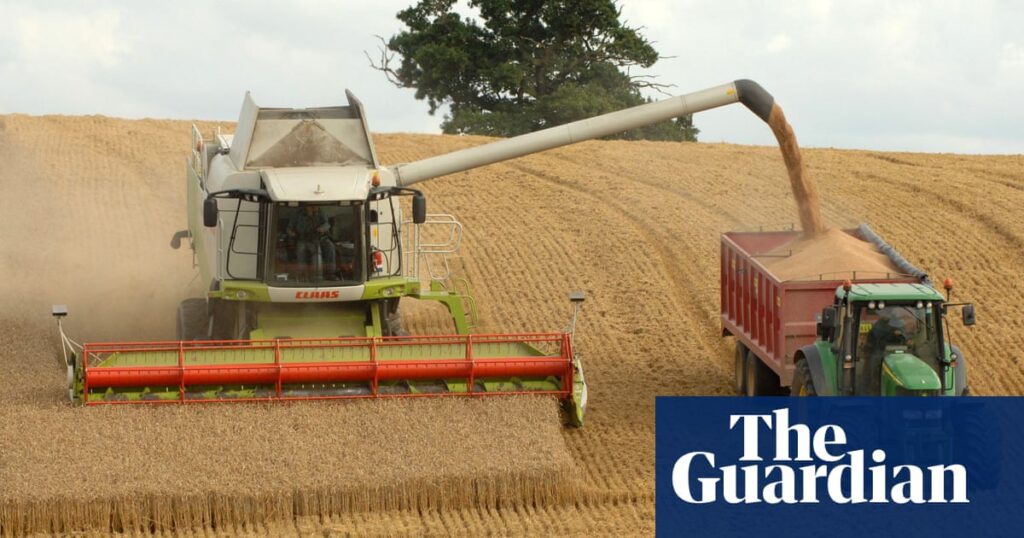England has suffered its second worst crop on record – with fears growing for next year – after heavy rains last winter battered production of key crops including wheat and oats.
Cold and wet weather, which extended from last autumn through spring and early summer, has severely impacted the fast-growing UK wine industry, with producers saying harvests fell by between 75% and a third, depending on the region.
For staple crops, England's wheat supply is estimated at 10 million tonnes, or 21%, down on 2023, according to analysis of the latest government data by the Energy and Climate Intelligence Unit (ECIU).
Winter barley is down 26% on last year, and the winter oilseed rape crop is down 32%, in data released by the Department for Environment, Food and Rural Affairs on Thursday.
The ECIU estimates that farmers could lose £600 million on five key crops – wheat, winter and spring barley, oats and oilseeds – as production falls by 15% in total.
Tom Lancaster, EU Land, Food and Farming analyst, said: “This year’s crop has been a shock, and climate change is to blame. While shoppers were partly insulated by imports picking up some of the slack, British farmers bore the brunt of the second-worst crop on record.
“Climate change is clearly the biggest threat to food security in the UK. These impacts will only get worse until we reduce our greenhouse gas emissions.
He added that record rainfall in September led to a bad start to the new season, forcing farmers to postpone planting in some parts of the country and lose the most productive winter crop by having to wait until spring.
“We are now on the brink,” said Colin Chappell, a farmer in Lincolnshire. Last week, we got about 2 inches of rain in 36 hours here, and we're not in the worst of conditions. Some farms in southern England have lost their crops for the second year in a row. Many will now rely on spring wheat again this year, which only produces about half of winter wheat.
“We are reaching a situation where autumn planting has become unviable due to floods, and spring planting is risky due to drought.”
Lancaster also called on the government to use this month's budget to support more sustainable agriculture which will build resilience to the extreme weather the UK is now facing.
“The alternative is to allow the effects of these climate impacts to worsen in the coming years,” he said.
Concern over staple crops comes as it emerged Britain's wine crop may decline from last year's bumper, cork-popping crop to a light crop as a cool, wet summer led to mold and disease problems and fewer grapes on the vines.
Several independent growers told The Guardian it had been a “challenging season”, with vineyards in southwest and northern England and parts of Wales particularly hard hit.
Sign up for Business today
Get ready for the workday – we'll direct you to all the business news and analysis you need every morning
Privacy Notice: Newsletters may contain information about charities, online advertising and content sponsored by third parties. For more information see our privacy policy. We use Google reCaptcha to protect our website and the Google Privacy Policy and Terms of Service apply.
After promoting the newsletter
Crops suffered from cold and humidity, while some proposed vineyards were exhausted after last year's massive production.
Duncan Schwab, head winemaker at Sandridge Barton, a 16-hectare (40-acre) estate in south Devon, said he expected volumes to be down 70% on last year. He said many farmers in the Southwest have faced similar problems. “It's kind of like catching grapes out there,” he said.
Plumpton Wine Estate in Sussex said it had only harvested half as much as last year because it was “facing challenges with disease pressure due to persistent rain”.
Last year's mild, wet winter allowed for disease outbreaks in the vineyards, then heavy rains in April and May made processing plants difficult because equipment in swampy conditions limited the use of heavy equipment. Schwab said the rains in early summer “ruined the blooming process.”
Despite the problems, Schwab said wine prices are unlikely to rise because many winemakers will have inventory held from last year's record harvest, which will help offset the ups and downs in supply.


